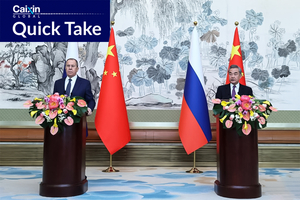China Explains Why It Is ‘Hardly Able’ to Attend Ukraine Peace Summit in Switzerland
Listen to the full version

China is “hardly able” to attend the Ukraine peace summit in Switzerland due to significant differences between the meeting’s arrangements and China’s principles, as well as international expectations, a Chinese foreign ministry spokesperson said.
“China … has informed relevant parties of our consideration and concerns,” Mao Ning said in a press conference Friday. “We will continue to promote talks for peace in our own way, maintain communication with all parties and jointly accumulate conditions for the political settlement of the Ukraine crisis.”

Unlock exclusive discounts with a Caixin group subscription — ideal for teams and organizations.
Subscribe to both Caixin Global and The Wall Street Journal — for the price of one.
- DIGEST HUB
- China will not attend the Ukraine peace summit in Switzerland, citing differences with the summit's arrangements and its principles.
- Moscow supports Beijing's decision not to attend and emphasizes the need for equal participation of both Russia and Ukraine in peace talks.
- Switzerland invited over 160 countries to the summit; about 70 confirmed attendance, including the U.S., though neither President Biden nor Vice President Harris will attend.
China has announced that it is "hardly able" to attend the Ukraine peace summit in Switzerland due to substantial differences between the meeting's arrangements and China's own principles and international expectations [para. 1]. Chinese foreign ministry spokesperson Mao Ning stated that China has communicated its concerns to relevant parties and will continue to promote peace talks and maintain communication in its own way [para. 2]. This marks China’s first definitive response regarding its attendance at the summit, which is scheduled for June 15 and 16 [para. 3].
Switzerland agreed to host the summit at the request of Ukrainian President Volodymyr Zelenskyy, who visited Switzerland officially earlier this year [para. 4]. China values Switzerland's initiative and has been in close contact with relevant parties since early this year, according to Mao [para. 5].
China insists that the summit meet three conditions: recognition from both Russia and Ukraine, equal participation of all parties, and fair discussion of all peace plans. These conditions are designed to reflect the international community’s concerns, especially those of developing countries [para. 6]. However, based on feedback and arrangements for the summit, China believes these conditions will not be met, Mao stated [para. 7].
Russian Presidential Assistant for International Affairs, Yury Ushakov, appreciated China's likely decision to skip the summit, noting that it aligns with China’s balanced stance regarding international conferences about Ukraine [para. 8]. Notably, Russia itself will not participate in the summit as it was not invited at this stage and has shown no interest in attending the event [para. 9][para. 10].
Chinese officials and others, such as Swiss FDFA head Ignazio Cassis, have emphasized that real peace negotiations need to involve both Russia and Ukraine equally [para. 11]. Excluding Russia from the summit is seen as problematic, as achieving peace without involving all warring parties is viewed as unrealistic. This sentiment was echoed by Ukrainian Foreign Minister Dmytro Kuleba, who highlighted Ukraine's past experiences of unsuccessful negotiations with Russia and expressed a desire not to repeat the same mistakes [para. 12].
The Swiss government has invited over 160 countries to the summit, aimed at discussing pathways to a comprehensive and lasting peace for Ukraine based on international law and the UN Charter. Approximately 70 countries have confirmed their attendance [para. 13]. Details about the participants and the full agenda remain unclear, although European leaders from France and Germany are expected to attend, while India and Brazil will send lower-level representatives. The U.S. is confirmed to participate, but neither President Joe Biden nor Vice President Kamala Harris will attend due to scheduling conflicts [para. 14].
The summit aims to cover topics like exchanges of prisoners of war, nuclear plant safety, and the return of kidnapped Ukrainian children, but it is uncertain if it will address Russia's complete withdrawal from Ukraine, a primary demand of Kyiv [para. 15]. The Swiss government has stated that the first summit is just a beginning, and a second meeting where Russia’s participation will not be ruled out is being considered [para. 17].
In summary, Russia and China’s reluctance to participate based on principles underscores the challenges facing the summit. Russia’s Foreign Minister Sergey Lavrov supported China's position, highlighting the importance of addressing root causes and protecting all parties' legitimate interests based on equal and indivisible security [para. 18]. The international community largely does not recognize Russia’s annexation of four Ukrainian regions [para. 19].
Contact reporter Lin Jinbing (jinbinglin@caixin.com) for further queries [para. 20].
- January 2024:
- Switzerland agreed to host the Ukraine peace summit at the request of Ukrainian President Volodymyr Zelenskyy.
- February 2024:
- Swiss FDFA head Ignazio Cassis visited Beijing and noted that excluding Russia would make organizing a peace summit difficult.
- March 27, 2024:
- Ukrainian Foreign Minister Dmytro Kuleba stated that achieving peace without the warring parties’ participation is unrealistic and highlighted the importance of involving both parties equally in peace talks.
- May 14, 2024:
- Russian Presidential Assistant for International Affairs Yury Ushakov appreciated China's presumed decision not to attend the summit.
- May 30, 2024:
- Russian Foreign Minister Sergey Lavrov stated that Beijing's efforts are aimed at creating favourable conditions for resolving the Ukraine crisis.
- May 31, 2024:
- Chinese Foreign Ministry spokesperson Mao Ning stated that China is hardly able to attend the Ukraine peace summit and gave reasons for it during a press conference.
- May 31, 2024:
- Switzerland's FDFA updated its webpage stating that Russia has not been invited to the summit.
- PODCAST
- MOST POPULAR






